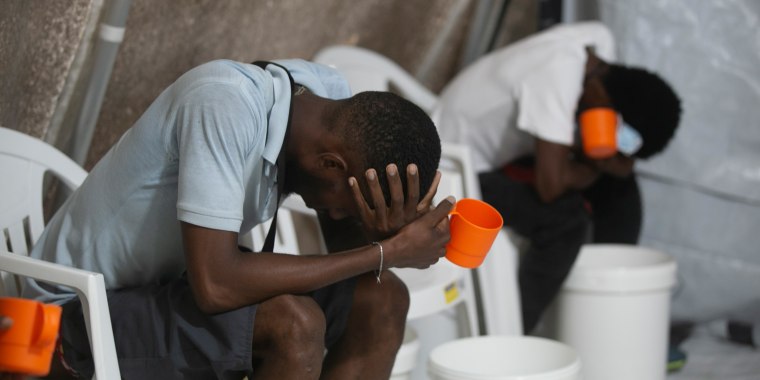On Oct. 2, 12 years after United Nations peacekeepers are believed to have brought a cholera outbreak to Haiti that killed nearly 10,000 people, the island nation’s ministry of health reported a new outbreak of cholera. According to the United Nations, an outbreak in the national penitentiary in Port-au-Prince had killed at least nine people by Sunday.
The catastrophe in 2010 occurred in the wake of the devastating earthquake that year. This outbreak is happening more than a year after the country’s president was assassinated and gangs took over the streets. That gang violence is a direct cause of the growing public health emergency, as their takeover of a fuel terminal has halted sanitation and clean water distribution and led to closures of hospitals and health centers.
This outbreak is happening more than a year after the country’s president was assassinated and gangs took over the streets.
In both instances, the disease is a consequence of widespread instability and chaos. As was the case in 2010, there are no easy answers to the sociopolitical situation that underpins the crisis. But it is imperative that the U.S. do everything in its power to mobilize aid to halt the outbreak, and, further, to urgently address the dire circumstances of those trapped in the prison.
What exactly is cholera and how did the current outbreak start?
Cholera is an acute illness caused by the bacteria Vibrio cholerae, which releases a toxin that induces secretion of large amounts of fluid from the small intestine. The diarrhea, so watery that it’s referred to as “rice-water stool,” causes rapid dehydration. The expelled diarrhea is teeming with bacteria, enabling spread from human to human through feces-contaminated food and water. Crowded living conditions, poor sanitation, lack of clean water supply, lack of access to basic treatment and mitigation measures (all present in Haiti right now) make it more likely that live bacteria are ingested and become deadly.
To repeat a point above, Vibrio cholerae thrives in crisis.
Though the 2010 outbreak that researchers say was brought by U.N. peacekeepers after that January’s magnitude 7.0 earthquake killed almost 10,000 people, it made more than 800,000 people sick.
Why is cholera spreading so rapidly in the prison?
Haiti’s prisons are notoriously crowded and inhumane. More than 80% of those prisoners are pretrial detainees who have not been convicted of a crime; others were deported from the U.S. after seeking asylum here and were jailed upon arrival back in Haiti even though they have not been charged with a crime. According to a report from Peste Magazine, in lieu of working toilets, multiple prisoners share buckets. On Sunday, the AyiboPost, a Haitian news website, reported that prisoners “sleep in a sea of feces.”
Without any semblance of barriers to the spread of cholera, the place is “a tinderbox for the outbreak,” according to Louise Ivers, director of the Harvard Global Health Institute. Every person in the penitentiary is currently at high risk for disease and death, a crisis nested within a crisis.
On Friday, Fritznel Pierre, a human rights defender in Haiti, shared a voice note with Ivers from a prisoner that said: “People are sick. People are dying. It’s been four days they didn’t give us food or water. They have not let us out [of the cells].
Why are those affected dying so rapidly?
With severe disease, the fluid losses from diarrhea are so rapid and profound that people can develop kidney failure and shock and die within hours after the onset of symptoms. Cholera drains the circulation of what it needs to perfuse the organs so quickly that it is the infectious disease equivalent of a trauma victim bleeding out. Calls for aid out of Haiti convey the need for rapid action, because hours mean all the difference for those with the disease and can determine how widespread the disease is transmitted.
What is particularly tragic about any death from cholera is that it is so simply treated: the mainstay is adequate hydration with balanced sugar and electrolytes.
What is particularly tragic about any death from cholera is that it is so simply treated: the mainstay is adequate hydration with balanced sugar and electrolytes. Often these can be given orally, not requiring an intravenous line. Inexpensive, single-dose antibiotics may help reduce diarrheal volume and shorten the course of the disease. Yet the same utter lack of humane living conditions and treatment that allows cholera to spread also means that the prisoners are not afforded the sparest of medical care.
What steps will save lives?
The simplicity of the lifesaving treatments also means that a considerable change in course is possible. Collective action is sustaining some positive action: Culligan Water — which had previously announced that it had to shut down its water service because it didn’t have diesel to process, bottle and deliver water — announced that it was back in business Sunday after other companies pooled together to share their fuel supplies. Haitian public health workers have significant experience treating cholera and interrupting transmission effectively, if given assistance navigating the considerable infrastructure challenges.
International aid agencies are beginning to work with Haitian health authorities to set up emergency cholera treatment centers and distribute oral rehydration solution. However, it remains to be seen if aid will reach those inside the penitentiary, if prisoners can be evacuated to safe conditions and treated effectively, and if assistance can occur in time to save the majority of lives.
Last week there was dispiritingly little news or dialogue about the health crisis as it unfolded. The authors of the Peste article, who wrote that they received cellphone messages from people who are imprisoned, reported, “The men tell us they feel abandoned.”
It is a matter of our own collective humanity to refuse to abandon them to mass illness and death, to see and hear their plight, and intervene.
